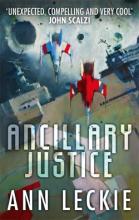Ancillary Justice - Ann Leckie

"Ancillary Justice" is a well-written novel about one segment of an AI hive mind pursuing revenge against a colonial empire that doesn't see gender distinctions.
Throughout the book, the wit and craft behind the writing is clear. I particularly enjoyed the style of banter between the different characters, and everything flowed together very well -- the pacing was fairly quick, the switches between the present and the past were well synchronized, and the themes were generally interesting.
One thing that you see throughout the book is the lack of gender distinctions in the empire's society, which the AI grew up in. Their language doesn't have linguistic gender, so the AI always calls everyone "she." There are a few interactions with people from other cultures that do have linguistic gender, and the AI often messes up in those circumstances, but enough of the book is written from the AI's perspective that I actually have no idea whether most of the characters would identify as male or female. It is extremely well done. The book is only occasionally explicit about any of the philosophical underpinnings of the social construction of gender, but I think the mindspace I occupied when reading "Ancillary Justice" drove the argument home more clearly than Judith Butler ever did.
Leckie also does a good job exploring the notions of individuality and collectivity by featuring part of a hive mind as the protagonist. It's hard to understand at first, but it gets clearer as the book progresses, and the exploration of what it means to be part of a larger whole becomes more and more important to the plot.
That said, I don't find the explanation of how AI work to be entirely compelling. Why use human bodies to house the AI rather than a silicon brain and a metal body? The empire has significant reservations about using humans to house AI, the society is advanced enough to have AI that can live in a traditional computer, and the society has a sufficient understanding of robotics to make robots that look realistic. They would just use robots. Also, why give the AI "emotions"? The book presents it as the only way to make it possible for AI to choose between zillions of possible options without facing decision paralysis. Only, current-day computers manage okay without having "emotions" -- Google decides which of billions or trillions of web pages to show you in response to the stimulus of your search terms, and it manages to do that in a fraction of a second. A substantial amount of computer science involves figuring out how to frame the goals of the problem correctly -- what are you trying to optimize? -- and then coming up with a strategy of how to achieve that goal. It doesn't seem very likely to me that "emotion" would be how the programmers of AI would choose to prevent decision fatigue as opposed to something simpler, like you see, for instance, in Big Hero 6.
That doesn't get in the way of the novel, though. I thoroughly enjoyed it, and I would highly recommend it to anyone who wants to read a good sci-fi novel, think about gender, or think about collectives.



